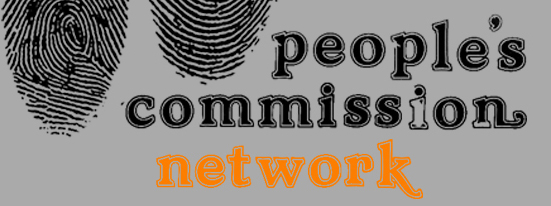People's Commission Network Popular Forum
Forum promo
Listen to the forum promo.
Content
Help develop Content
You can join one of the following five thematic working groups:
HISTORICAL PERSPECTIVES ON NATIONAL SECURITY: DELEGITIMIZATION OF DISSENT AND MARGINALIZATION OF COMMUNITIES
In responding to the current realities of repression in the name of national security, it's important to have an understanding of previous grassroots responses to national security repression. This working group will provide historical perspective on national security in both Canada and Quebec. We will explore the history of the criminalization and repression of dissent - right up to the introduction in 2001 of the Anti-Terrorist Act and present day defunding of NGOs critical of government policy - and in doing so dispel the myth of a humanitarian Canada. We will particularly emphasize Indigenous sovereignty movements and the historical targeting of anti-colonial organizing in Canada, including its impact on social movements outside Canada. Overall, this working group will provide a grounding for the other themes that will be explored during the forum.
MILITARY-SECURITY INDUSTRIAL COMPLEX
$1 billion was spent on “security operations” around the G20 summit in Toronto. In fact, the national security agenda has developed its own economic momentum with the enormous growth of the "security" industry. The military-industrial complex has branched out into the security, surveillance and interrogation sector, which profits from and feeds the "war on terror", in which political dissent is increasingly labelled “terrorism”. As a sign of this trend, in the past decade, the Canadian arms producers' association was renamed the "Canadian Association of Defence and Security Industries" (CADSI). We will map the presence of these companies in Montreal and they role they play in repression in Canada and elsewhere. We will also support the BDS campaign by exposing companies with links to Israel which, along with the US, EU countries and Canada, plays an important role in the growth of the international security industry.
CSIS WATCH

The CSIS Watch working group aims to expose and oppose the Canadian Security Intelligence Service (CSIS). We will examine CSIS' powers, its mandate, its many abuses (such as its role in sub-contracting torture and use of intelligence derived under torture), the role it plays in gathering information for other intelligence agencies, as well as the political and economic interests that CSIS serves (including those of other states). Importantly, we will examine the ways in which movements can effectively maintain solidarity and unity in the face of CSIS targeting, specifically by effective non-cooperation with CSIS and other state agencies. This working group will emphasize how CSIS engages in racial profiling and attempts to chill dissent, particularly by youth. We will discuss ways in which we can effectively inform communities and individuals to deal with CSIS harassment, and challenge its impunity, as part of ongoing organizing efforts for social justice.
BLACKLISTS, BLACKLISTING and the ANTI-TERRORIST ACT
One of the most widely used mechanisms adopted by states and intergovernmental agencies in service of their national security agendas is the creation of various blacklists: lists of terrorists groups and individuals, no-fly lists, lists of 'persons of interest', the UN 1267 committee list, and more. These lists ensnare large numbers of groups and individuals in the net of states' repressive powers and the mainstream media has, for the most part, uncritically accepted listings as legitimate. People are jailed; assets are frozen; and political movements – both in Canada and overseas - are crippled and forced underground. Because of the repressive effects of listings on individuals, communities and social movements, we will develop strategies to challenge the politically loaded process though which groups and individuals find themselves listed, particularly under Canada’s Anti-Terrorism Act. In solidarity with those whose lives have been ruined or whose movements have been marginalized because of a listing, we will develop strategies to oppose blacklists such as Canada' list of "terrorist entities", the UN Security Council's "1267 list" and the others.
IMMIGRATION SECURITY MEASURES
In Canada and around the world migrants and refugees find themselves in particularly vulnerable positions vis-a-vis state authorities in their new homes. The Canadian state has developed a complex system of national security mechanisms that target immigrants and refugees. Following on the work of the People's Commission on Immigration Security Measures, held in Montreal in 2006, we will continue to critique and resist the ways in which non-citizens are targeted and affected by the national security agenda: deportations, denied entries, security certificates and other secret trials, long security delays for those seeking residence and deportations despite acknowledged risk of torture. We will focus in particular on the ways in which immigration security measures often force people to disassociate with the political and social movements they previously supported and the manner in which immigration security measures are selectively applied to those who have been involved with overseas movements opposed by the Canadian state. This working group will attempt to highlight the experiences of those directly affected by immigration security measures in Canada, the ways in which these measures repress political dissent of immigrants, and choke support for resistance movements overseas. Our goal is to formulate concrete strategies for resisting this draconian system and for working in solidarity with those targeted by these measures.
These working groups are developing content for the conference and will propose post-conference strategy.
To join one of the five working groups: commissionpopulaire@gmail.com

The People's Commission Network is a working group of QPIRG-Concordia qpirgconcordia.org 514.848.7585 info@qpirgconcordia.org

Contact the People's Commission Network: QPIRG Concordia - Peoples's Commission Network c/o Concordia University 1455 de Maisonneuve Ouest Montreal, QC, H3G 1M8 commissionpopulaire@gmail.com
This website is based on the Fluid 960 Grid System





